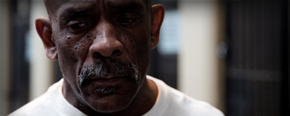Death sentence
Back to other Dying Behind Bars stories »
Inmates’ deaths mean no chance to say good-bye
Before Daniel Martin went back to prison, he told his wife, “I’m not coming back this time. I’m going to die in there.”
Ten months later, on July 18, Yolanda Martin got an early -morning call. On the other end of the line, an unfamiliar voice said, “I’m sorry to be the bearer of bad news, but your husband passed away last night.” Yolanda Martin and her sons, 20 and 27, said they could do nothing but remain silent and grieve. They say they were denied the common decency of saying their farewells.
In 30 of the state’s 33 prisons the policy is clear: Family will be notified of the medical condition of the prisoner only when the doctor determines he or she will not recover and is bound to die. Word occasionally comes too late. Due to security reasons, only then can family visit the inmate, according to California Department of Corrections and Rehabilitation spokeswoman Terry Thornton in Sacramento. There was no prior notification in Yolanda Martin’s case.
On average, one inmate a day dies in custody, according to the latest report by the California prison receivership. Due to visitation rules imposed by the CDCR, a lack of communication and an apathetic, overworked staff, families outside are often left feeling helpless, ignored and unjustly punished.
With the exception of California Men’s Colony, Central California Women’s Facility and California Medical Facility, which have a hospice unit, the CDCR forbids family visits for inmates too ill to get to the visiting rooms. Inmates often die with no chance to say goodbye to their children, spouses, partners or parents, even when they spend days or months in a hospital bed.
“They didn’t even let him call me. They didn’t explain anything to me,” Mrs. Martin said, her voice breaking over the phone from her home in Costa Mesa.
Yolanda Martin said the watch commander who delivered the news told her Daniel Martin died in a hospital outside of the California Correctional Center in Susanville, where he was serving his term for sales and possession of drugs. She last spoke to her husband over the phone less than two weeks before he died. They last saw each other eight months ago.
Had the CDCR let her know her husband had fallen ill, Yolanda Martin said she would have flown to Susanville to stand by his bed and spend their last few hours together. But the call was too late, and their 35-year relationship ended without good-byes.
Daniel Martin felt he would die in prison because his health was fragile when he went in. After battling an almost 30-year addiction to heroin, he had an infection that left one of his legs swollen. He required clean bandages and antibiotics daily, his wife said. The Martins went to court, supported by Daniel’s physician, in an unsuccessful attempt to keep him outside prison and under medical supervision.
“When they called me, they said, ‘Did you know that he had Hepatitis C?’ I said ‘no’,” Yolanda Martin said. She didn’t think he knew either.
“They said he died of kidney failure.”
CDCR spokeswoman Thornton told News21 in an e-mail that the 51-year-old man died of natural causes.
Thornton said the inmate had been moved to a hospital unit inside the prison three days before his death, but this information was withheld from the widow due to CDCR rules. Yolanda Martin learned this through fragmented accounts from her husband’s cellmate and friends inside the prison.
This lack of communication between the CDCR and the families exacerbates the pain experienced by relatives in the outside, said Gretchen Newby, executive director of Friends Outside, an independent organization that supports around 200,000 relatives of inmates in the state.
“It’s a serious problem,” she said. “We have experience dealing with this. Unfortunately, in our experience, it is very often.”
Newby said that what happens in prison is a mystery to the family, and this makes them feel helpless. She said she thinks part of the problem is that the CDCR is not equipped to provide information to so many people on the outside since the system is overcrowded on the inside. When families approach Friends Outside, there’s not much left to do but help them understand the rules surrounding prisons.
Selerina Arteaga of Los Angeles County also lost a family member behind bars. Her father, Jose Arteaga, 79, was serving a 29-year sentence in Mule Creek State Prison for sexual assault. He died unexpectedly July 5. The daughter heard the news from a family friend and contacted the CDCR.
“First they said it was of natural causes, and then they said it was prostate cancer,” Selerina Arteaga said, speaking the day after her dad’s funeral in their hometown of La Puente.
“Nobody knew what was going on. They transferred me from one person to another, and it was really brief: ‘Oh yes, he passed away in San Joaquin County, natural causes — oh no, prostate cancer’,” Arteaga said.
“Why didn’t they let him call me?”
In Jose Arteaga’s case, the CDCR told News21 the inmate was admitted to a hospital 10 days before he died. Prison staff do not notify families when an inmate is transferred to a hospital. Selerina Arteaga was not informed when her father died, the department said, because her contact information was outdated.
“Unfortunately, this is not an uncommon event,” CDCR spokeswoman Thornton said, adding that it’s up to the inmate to keep these records up-to-date.
A lot of what happens when an inmate falls ill is in the hands of the correctional officers, said John Espinosa Nelson, 43, a former inmate of Wasco and Folsom state prisons as well as the California Rehabilitation Center.
“Nowhere in that chain is there an urge to call their families,” he said. “There’s nothing to obligate them to call their family members and tell them.”
During his four years behind bars, Nelson, who was convicted of robbing bookstores and banks at age 22, he said he witnessed many accounts of neglect toward inmates, some of which ended fatally.
In the case of one fellow inmate, Nelson said, after complaining of a migraine and pain in his back and neck, he banged on the nurse’s window to get medication for a week until he collapsed on the floor. He was taken away and never seen again. Next to his name on the daily inmate roster a few days later was the word, “dead,” said Nelson.
Because Nelson held a position as a clerk in prison, he said he had access to information the other inmates didn’t. During his work, he learned his fellow inmate had died of spinal meningitis, a highly contagious infection.
“Information is the most important currency of all in that environment,” Nelson said. “In terms of confirming what happened, we’re left to figure it out on our own.”
More than 330 inmates died in custody from the period of June 2008 to June 2009, according to the latest prison receivership’s report. The county coroner’s office opens an investigation and performs an autopsy when a cause of death is unknown. It is the last step in the process of an inmate dying in custody, before his remains are handed over to family or disposed of by the state.
During his 12 years in office, Marin County Coroner Kenneth Holmes has dealt with people who yearn to know more about their relatives’ death behind bars. His responsibilities include investigating deaths that happened at San Quentin State Prison.
“The CDCR is not as communicative as the families would like,” Holmes said. “Families typically will say to us ‘Geez, we’re not getting much out of the prison about what happened out there.’”
“I’ll tell them everything I know,” he said. But the only information Holmes can provide for them is medical. Sometimes, that means informing them of serious hereditary illnesses found in the autopsy.
What most families crave to know are details of their loved one’s last moments. But the felony conviction often prevents sharing these details with the bereaved relatives.
“We have to remember that, like a lot of things, there’s always two sides of every story,” said Gretchen Newby, from Friends Outside. The victims of the crimes committed by these inmates may not feel like justice is served if the law becomes lenient at the end of a criminal’s life, she said.
Coroner Holmes observed:
“Death is the great equalizer. You’re no different than me if we’re both dead.”
Credits
Reporting by Isabella Cota
Photography by Karen McIntyre
Production by Cota and McIntyre
Other Dying Behind Bars Stories

Three Strikes
Berkeley's News21 project explains California's three strikes law and its effect on the prison population.
